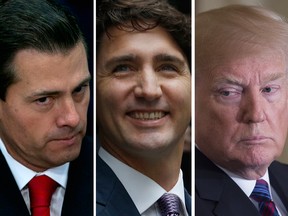Extended NAFTA talks, U.S. tariff threats amplify trade uncertainty and complicate major investment deals
Chrystia Freeland told reporters last week that it was unclear whether the U.S. would continue to exempt Canada from the tariffs as NAFTA talks continue

Article content
OTTAWA — Pressure is ramping up on Ottawa to conclude North American Free Trade Agreement talks, as trade uncertainty continues to complicate major capital investments in Canada and as U.S. officials threaten fresh tariffs on steel and aluminum imports.
Canada, the United States and Mexico failed to reach an agreement on NAFTA last week, after widespread speculation negotiators were nearing a deal. The three countries have now agreed to continue talks on May 7.
The extension of NAFTA talks comes as officials blow past a crucial deadline, potentially saddling Canada with heavy tariffs and edging negotiators closer to the Mexican general election in July, which observers say could grind negotiations to a halt.
Canada could now face steep tariffs on its steel and aluminum exports as early as Tuesday, May 1, after the Trump administration said it would impose hefty duties on Canadian and Mexican imports if the three countries couldn’t meet a deal before that date.
Foreign Affairs Minister Chrystia Freeland told reporters last week that it was unclear whether the U.S. would continue to exempt Canada from the tariffs as NAFTA talks continue, saying: “that’s a question for the United States, not for Canada.”

The Trump administration announced in early March that it would level tariffs on imports of steel, at 25 per cent, and aluminum, at 10 per cent, in an effort to restrict a flood of cheap supplies from China and elsewhere. It later gave Mexico and Canada exemptions on those duties, contingent on whether NAFTA could be signed.
Freeland told reporters in Washington that officials from all sides were working around the clock to get a deal finalized.
“People are cancelling holidays. People are working weekends,” she said.
NAFTA delays come as analysts warn of falling investment levels by Canadian businesses, further intensifying the pressure on Ottawa to close a deal. Bank of Canada Governor Stephen Poloz has repeatedly warned that NAFTA risks are causing businesses to defer major capital investments decisions, in turn weakening overall economic growth.
Meanwhile, NAFTA talks loom particularly large over two major potential transactions in Canada.
Experts say that an ongoing bid by Royal Dutch Shell Plc to build a $40-billion LNG facility on Canada’s West Coast is unlikely to move ahead amid NAFTA talks, as the project requires a remission order from Ottawa to remove tariffs on prefabricated steel modules that would be imported from South Korea and China.

The tariffs were introduced by Canada in response to anti-dumping and countervailing complaints made by domestic manufacturers, and would significantly raise construction costs on the project. But experts say Ottawa is unlikely to issue the order amid ongoing talks with the U.S., which has slapped its own duties on cheap inflows of steel.
NAFTA negotiations could also cause delays in the $1.5-billion takeover of Canadian construction firm Aecon Group Inc. by a Chinese state-owned enterprise. The transaction is currently under full national security review by Investment Canada.
An approval of the deal could sour negotiations with the U.S., people familiar with the talks say, as the Trump administration has raised alarms over China’s perceived willingness to influence foreign governments through major capital investments in companies and infrastructure.
The final deadline to approve the Aecon takeover is July 13.
A number of news reports in recent weeks have suggested NAFTA talks are in their final stages, as the three countries aim to sign an “agreement in principle” that lays the groundwork for a comprehensive deal.
Officials have said that progress has been made on so-called “rules of origin” stipulations in NAFTA, particularly for automakers, which has been a core issue during the talks. But that progress reached an impasse on the latest round of talks, setting back overall negotiations, recent reports have said.
Most notably, the U.S. recently called for a certain portion of vehicles to be manufactured in factories that pay workers more than US$15 per hour, effectively singling out Mexican producers.
Other issues also persist, including over rules that would place a stronger emphasis on buying American-made products, abolishing Canada’s protections for dairy producers, disagreements over dispute resolution mechanisms, and a “sunset clause” that would terminate the agreement in five years.
High level discussions will continue in Washington on May 7.
Our website is the place for the latest breaking news, exclusive scoops, longreads and provocative commentary. Please bookmark nationalpost.com and sign up for our politics newsletter, First Reading, here.









Postmedia is committed to maintaining a lively but civil forum for discussion. Please keep comments relevant and respectful. Comments may take up to an hour to appear on the site. You will receive an email if there is a reply to your comment, an update to a thread you follow or if a user you follow comments. Visit our Community Guidelines for more information.